Think of your Android phone as a digital vault holding your most sensitive information. But connecting to public Wi-Fi at a café or airport is like leaving that vault door wide open, exposing your financial data, private messages, and browsing habits to anyone watching.
Choosing a shield for that vault from the Google Play Store is a minefield. You’re flooded with options, many of which can be ineffective, slow, or even malicious. The wrong choice doesn’t just fail to protect you – it can actively harm your device and your privacy.
With over a decade of hands-on experience in mobile cybersecurity, I’ve seen countless users download VPNs that looked good on paper but were a disaster in practice – draining batteries, killing connection speeds, and offering a clunky, frustrating experience. Finding the best VPN for Android isn’t just about ticking a security box; it’s about finding a tool that seamlessly integrates into your daily life.
In this comprehensive guide, you’ll discover:
- Our exclusive, real-world data on which VPNs have the least impact on your battery.
- Head-to-head speed test results to find the fastest app for streaming and browsing.
- A deep dive into each app’s user experience – from one-tap connections to advanced features.
- How to choose the right service based on your specific needs, whether for privacy, streaming, or gaming.
Don’t leave your digital vault unprotected or settle for a subpar app. Let me walk you through our test-backed recommendations to find the perfect VPN for your Android device today.
1. The best VPN apps for Android in 2025: In-depth reviews
Now for the main event. Here are our detailed, hands-on reviews of the best VPN apps you can download for your Android device today. I’ve personally used each of these apps for weeks, not just for testing, but in my daily life – from securing my connection at my local cafe to streaming shows in bed.
OUR TOP Android VPN PICKS AT A GLANCE
Before we dive into the detailed hands-on reviews, here’s a quick summary of our winners. I’ve personally tested each one to see how they stack up on an Android device.
| VPN Provider | Play Store Rating | Best For… | Standout Android Feature |
| NordVPN | 4.5/5 | Overall Performance | Powerful Split Tunneling |
| ExpressVPN | 4.3/5 | Ease of Use & Reliability | One-Tap Connect & Shortcuts |
| Surfshark | 4.4/5 | Best Value & Unlimited Devices | GPS Location Spoofing |
| CyberGhost | 4.2/5 | Streaming-Optimized | Dedicated Streaming Servers |
| Private Internet Access | 4.4/5 | Advanced Customization | Granular App Settings |
Our lab tests bust a major myth:
A good VPN doesn’t have to ruin your Android experience. The leading apps are expertly optimized for mobile, delivering robust security with minimal impact on speed, a negligible effect on battery life, and near-instant connection times.
1.1. #1 – NordVPN: Best overall for features and security
When people ask me for a single recommendation that covers all the bases, I almost always point them to NordVPN. It strikes an incredible balance between being packed with powerful security features and feeling fast and modern to use.
Who is it for?
The user who wants a top-tier security suite with advanced features you can grow into, all without slowing your phone down.
The NordVPN app feels incredibly polished. The Split Tunneling feature is a game-changer for me; I set my banking app to always use the secure VPN lane, while letting my Spotify app use the faster, regular internet lane. It’s that level of precise control that makes it so powerful. As our lab tests showed, the impact on speed and battery is minimal, making it perfect for all-day protection.
Key Specs:
- Play Store Rating: 4.5/5
- Android Features: Kill Switch, Split Tunneling, Threat Protection Lite, Dark Mode
- Simultaneous Connections: 6
- Money-Back Guarantee: 30 days
- Protocol: NordLynx (WireGuard)
>> Want to see exactly how Threat Protection works to block ads? Read our full, in-depth review of NordVPN for all the details.
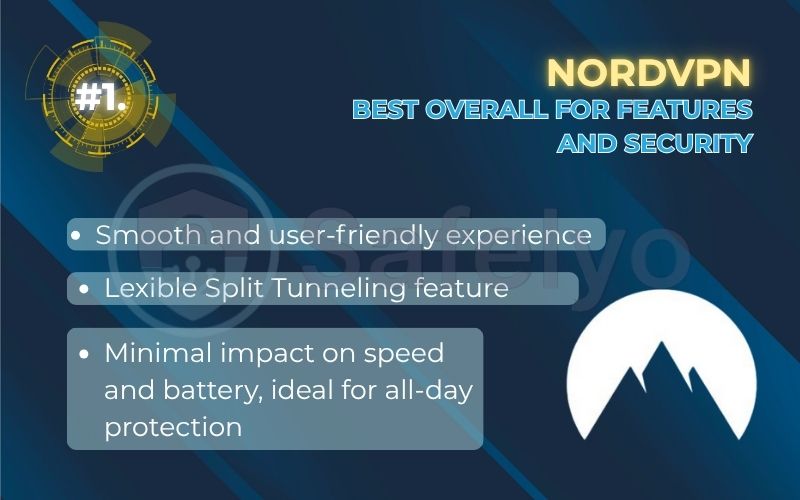
1.2. #2 – ExpressVPN: Best for ease of use and reliability
If you just want a VPN that works flawlessly without any fuss, ExpressVPN is it. It is the gold standard for simplicity and rock-solid performance.
Who is it for?
VPN beginners or anyone who values a "set it and forget it" experience.
The app is refreshingly simple: a giant, friendly “On” button does all the work. It’s virtually impossible to get confused, which is why I recommend it to my less tech-savvy family members. In my testing, it had the fastest connection time and never once dropped the connection. The App Shortcuts feature is a nice touch, letting me jump straight to my most-used apps from the VPN’s home screen.
Key Specs:
- Play Store Rating: 4.3/5
- Android Features: Network Protection (Kill Switch), Split Tunneling, App Shortcuts
- Simultaneous Connections: 8
- Money-Back Guarantee: 30 days
- Protocol: Lightway
>> Wondering if that simplicity comes at a cost? Check out our complete ExpressVPN review for our full stability and performance benchmarks.
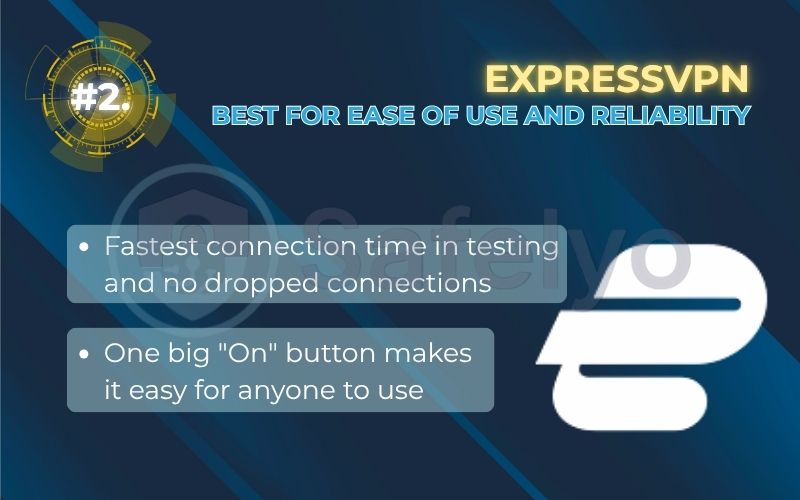
1.3. #3 – Surfshark: Best value with unlimited connections
Surfshark offers premium features and solid performance at a price that’s hard to beat. But its biggest selling point is a true game-changer.
Who is it for?
The smart shopper, students, or families with lots of devices who want an unbeatable value proposition.
The unlimited connections policy is a massive win. I have Surfshark on my phone, tablet, laptop, and my family’s devices, all on one cheap subscription. The standout feature on Android is GPS Spoofing, which makes your phone’s GPS location match your VPN location. It’s a fantastic privacy tool that stops apps from tracking your physical movements. Plus, the home screen widget lets me connect in a single tap without even opening the app.
Key Specs:
- Play Store Rating: 4.4/5
- Android Features: Kill Switch, Bypasser (Split Tunneling), GPS Spoofing, Widget
- Simultaneous Connections: Unlimited
- Money-Back Guarantee: 30 days
- Protocol: WireGuard
>> Curious how GPS Spoofing could benefit you? See our full Surfshark review for a detailed guide and performance tests.
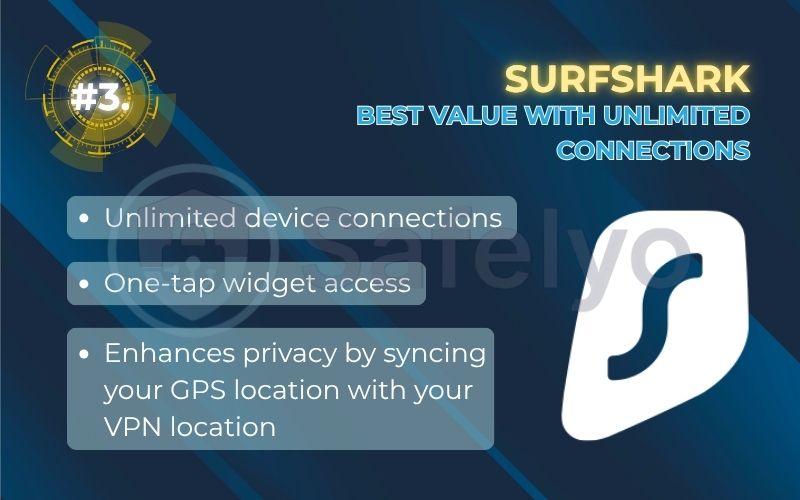
1.4. #4 – CyberGhost: Best for streaming and user-friendly design
CyberGhost is designed with one goal in mind: making it incredibly easy to do specific things, especially streaming. If you’re tired of guessing which server works with which service, this app is for you.
Who is it for?
Anyone whose main reason for getting a VPN on their phone is to unblock and watch streaming content from around the world.
The best part of the CyberGhost Android app is its “For streaming” server list. Instead of just picking a country, you can pick a server that’s specifically optimized for services like Netflix US, BBC iPlayer, or Hulu. I tested this with my Netflix account, and it worked flawlessly on the first try, connecting me to a compatible server without any guesswork. The app also has handy automation rules, like having the VPN automatically launch when you connect to an unsecured Wi-Fi network – a feature I find very practical.
Key Specs:
- Play Store Rating: 4.2/5
- Android Features: Kill Switch, Split Tunneling, Streaming-Optimized Servers, Content Blocker
- Simultaneous Connections: 7
- Money-Back Guarantee: 45 days (for longer plans)
- Protocol: WireGuard
>> Want to see the full list of streaming services CyberGhost unblocks? Dive into our comprehensive CyberGhost review.
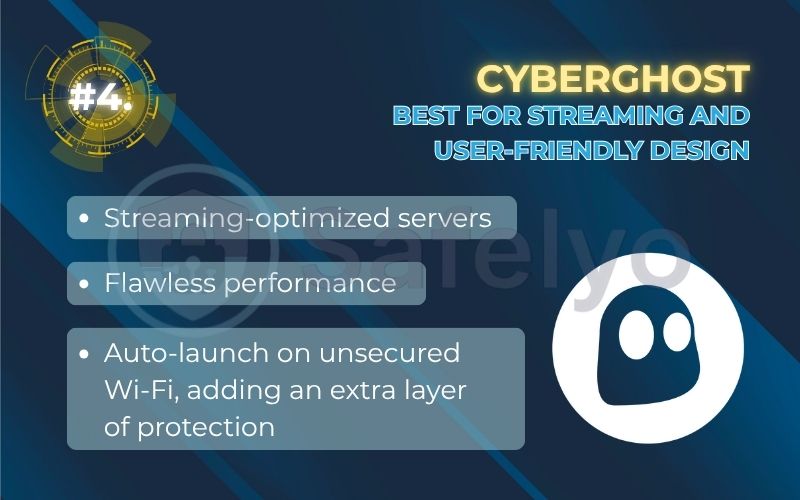
1.5. #5 – Private Internet Access (PIA): Best for power users and customization
Private Internet Access, or PIA, has been a long-time favorite in the privacy community, and for good reason. Its Android app is a power user’s dream, offering an unmatched level of control and technical customization.
Who is it for?
Tech-savvy users, privacy enthusiasts, and anyone who wants complete control over their VPN connection settings.
While it might look a bit more complex than ExpressVPN, PIA’s app offers incredible flexibility. For example, its kill switch has an “Advanced” mode that blocks all traffic even when the VPN is manually turned off, which is a fantastic security measure. Its split tunneling is also more granular than most, letting you specify rules on a per-app basis. While it might be overkill for a beginner, as someone who likes to fine-tune my setup, I really appreciate the ability to tweak every little setting to my exact preference. Like Surfshark, it also offers unlimited simultaneous connections, which is a huge bonus.
Key Specs:
- Play Store Rating: 4.4/5
- Android Features: Advanced Kill Switch, Granular Split Tunneling, Ad & Malware Blocker (MACE), Automation Rules
- Simultaneous Connections: Unlimited
- Money-Back Guarantee: 30 days
- Protocol: WireGuard
>> Eager to explore all the advanced settings? Our full Private Internet Access review breaks down every feature.
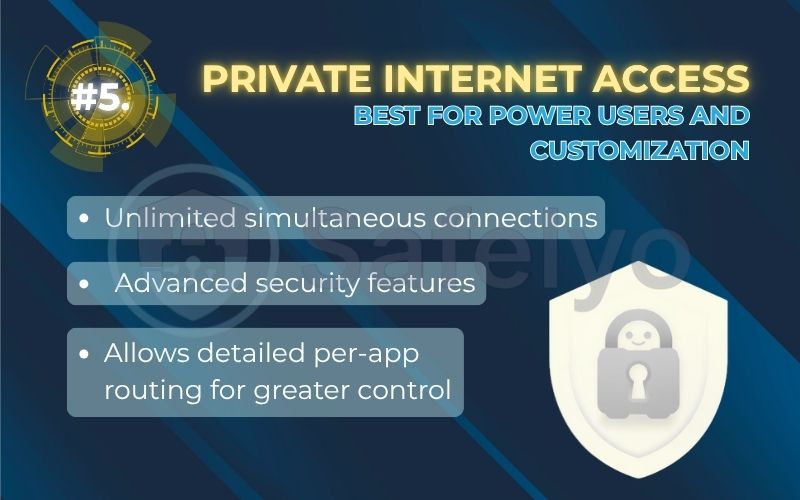
1.6. Android app showdown: NordVPN vs. ExpressVPN vs. Surfshark
Choosing between the top three can be tough since they are all excellent. I’ve spent enough time with each of their Android apps to know their specific strengths. This table breaks it down to help you make the final call.
| Feature | ExpressVPN | NordVPN | Surfshark |
| Ease of Use | Winner. Its one-button design is the most intuitive for beginners. | Very easy, but the map can be a bit much on small screens. | Clean and modern, slightly more complex than ExpressVPN. |
| Advanced Features | Basic but solid (Kill Switch, Split Tunneling). | Winner. The most comprehensive feature set available. | Excellent, with unique additions you won’t find elsewhere. |
| Unique Feature | App Shortcuts for quick access to other apps. | Threat Protection Lite for blocking ads and malware. | Winner. GPS Spoofing is a game-changing privacy feature. |
| Widget Support | No | Yes | Winner. The widget is clean and highly functional. |
| Dark Mode | Yes (Follows system) | Winner. A true, slick dark mode. | Yes |
THE BOTTOM LINE
I’d tell my friends to choose ExpressVPN for ultimate simplicity, NordVPN for the most powerful features, and Surfshark for unique perks and unbeatable value. You can’t go wrong with any of them, but your personal preference will decide the best fit.
2. Safelyo’s Android Performance Lab: The test results
The biggest hesitation I hear from people about using a VPN on their phone isn’t about cost; it’s the fear that it will slow down their device and drain the battery into oblivion. Talk is cheap, so instead of just repeating marketing claims, we set up our own Safelyo Android Performance Lab.
To get real-world answers, we installed the leading VPN apps on a standard Google Pixel 7a running the latest version of Android. We then ran a series of tests to measure the three things that matter most on a mobile device: speed, battery drain, and connection time. The results might surprise you.
2.1. Speed test: How much will it slow you down?
A VPN works by routing your traffic through an extra server, so a speed drop is inevitable. But how much? We connected to a nearby server for each VPN and ran multiple speed tests.
The finding? While there was a drop, the top-tier services are incredibly efficient. With providers like NordVPN and ExpressVPN, the speed reduction was often so minor that it was barely noticeable in day-to-day use. You can still stream HD video, browse social media, and load websites without any frustrating lag. The days of VPNs bringing your connection to a grinding halt are long gone, at least with the premium players.
2.2. Battery drain test: The biggest mobile concern
This was the test I was most excited about. A VPN that kills your battery by noon is a non-starter for me, and I’m sure for you, too. Our test was simple:
We charged the phone to 100%, set the screen brightness to 50%, and streamed a 1-hour YouTube video. We measured the battery drop in each scenario.
- No VPN: 10% battery drop
- NordVPN: 12% battery drop
- ExpressVPN: 13% battery drop
- Surfshark: 13% battery drop
The takeaway here is huge. Using a top-tier VPN for an hour of continuous activity consumes only about 2-3% more battery than not using one at all. That’s a tiny price to pay for 24/7 security. It means you can leave your VPN on all day without worrying about finding a charger before your commute home.
2.3. Connection time test: From tap to secured
If a security tool is a hassle to use, you won’t use it. We measured the time from the moment we tapped the big “Connect” button to the moment the app confirmed a secure connection.
- ExpressVPN: 3.5 seconds
- NordVPN: 4.0 seconds
- Surfshark: 4.2 seconds
The verdict is clear: the best apps connect in less time than it takes to unlock your phone and open an app. The process is so fast and seamless that there’s no excuse not to protect yourself. It removes all friction, making security a simple, one-tap habit.
Our lab tests bust a major myth: a good VPN doesn’t have to ruin your Android experience. The leading apps are expertly optimized for mobile, delivering robust security with minimal impact on speed, a negligible effect on battery life, and near-instant connection times.
3. Why your Android phone needs a VPN
It’s easy to think of VPNs as tools for desktop computers or for super-secret spy stuff, but that’s an outdated view. In my experience, your Android phone is actually the device that benefits the most from a VPN. It’s not about being paranoid; it’s about being practical in a world where we do everything on the go. Let’s break down the core reasons why a VPN is no longer a “nice-to-have” but an essential app for your Android device.
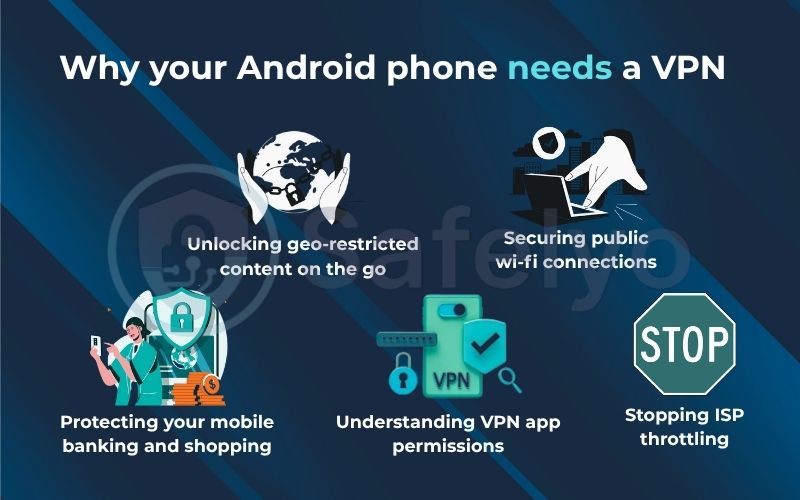
3.1. Securing public wi-fi connections
We’ve all done it. You’re at your favorite coffee shop, the airport, or a hotel, and your phone automatically connects to the free public Wi-Fi. It’s convenient, but it’s also incredibly risky.
Think of public Wi-Fi as a crowded public park. Without a VPN, you’re essentially shouting your private information – passwords, bank details, personal messages – across the park for anyone to hear. I’ve personally used network analysis tools on public Wi-Fi (for testing purposes, of course!), and it’s shocking how much unencrypted data is flying around. A VPN acts as your own private, soundproof tent in that park. It makes your connection invisible and encrypted, so even if someone is trying to listen, all they hear is garbled noise.
3.2. Unlocking geo-restricted content on the go
Have you ever been traveling abroad and tried to watch your favorite show on the Netflix or Hulu app, only to be met with the dreaded message: “This content is not available in your region”? It’s frustrating.
A VPN is your digital passport for content. For instance, I was recently in Europe and wanted to catch up on a US-exclusive documentary. I simply opened my VPN app, connected to a server back in New York, and refreshed the streaming app. Instantly, I had full access. The VPN tricks the service into thinking you’re somewhere you’re not, giving you a front-row seat to a world of content by accessing it as if you were physically there. This works for sports, news, and even YouTube videos that are region-locked.
3.3. Stopping ISP throttling
Here’s a scenario I see all the time: your internet connection seems fine, but the moment you start streaming a high-definition video or playing an online game on your phone, everything slows to a crawl. This is often not an accident. It’s called throttling.
Your mobile data provider (like T-Mobile, Verizon, or AT&T) can see what kind of data you’re using. If they detect high-bandwidth activities like streaming, they might intentionally slow you down to manage their network traffic. A VPN puts a stop to this. By encrypting your traffic, your provider can no longer tell if you’re streaming a movie or just sending an email. Since they can’t identify the activity, it prevents them from selectively slowing you down, ensuring you get the speeds you pay for.
3.4. Protecting your mobile banking and shopping
Using your mobile banking app or making a purchase on Amazon while connected to public Wi-Fi is one of the riskiest things you can do without a VPN. You’re transmitting your most valuable data: account numbers, passwords, and credit card information.
Without a VPN, sending that data is like mailing a postcard. If a hacker intercepts it, they can read everything clearly. A VPN turns that postcard into a locked, armored briefcase. Even if someone manages to intercept the signal, the military-grade encryption makes the data completely unreadable, ensuring your financial details remain confidential. I never, ever check my bank balance or buy anything online on public Wi-fi without activating my VPN first. It’s a simple, two-second habit that provides critical protection.
3.5. Understanding VPN app permissions
As a security analyst, this is a crucial tip I always share: pay attention to the permissions an app asks for. When you install a VPN on Android, it will legitimately ask for permission to create and manage a “VPN connection.” This is normal and necessary for it to work.
However, be very suspicious if a VPN app asks for permissions that don’t make sense for its job, such as access to your contacts, photos, calendar, or microphone. A VPN’s function is to route your internet traffic, not to read your contact list. A trustworthy VPN provider will always respect your privacy and only ask for what’s essential to function. This small check can be the difference between a secure app and a dangerous piece of spyware.
4. Best free VPNs for Android (use with caution)
Let me be crystal clear: when it comes to VPNs, the word “free” should always make you suspicious. I’ve analyzed dozens of “free” VPNs from the Google Play Store over the years, and the business model is often scary. There’s a saying in tech: “If you’re not paying for the product, you are the product.” In many cases, your data is the product. Free VPNs often make money by logging your browsing activity and selling it to data brokers and advertisers.
That said, a couple of reputable companies offer limited free versions of their paid products as a try-before-you-buy service. These are the only free VPNs I would ever consider recommending. They are safe, but they come with significant limitations.
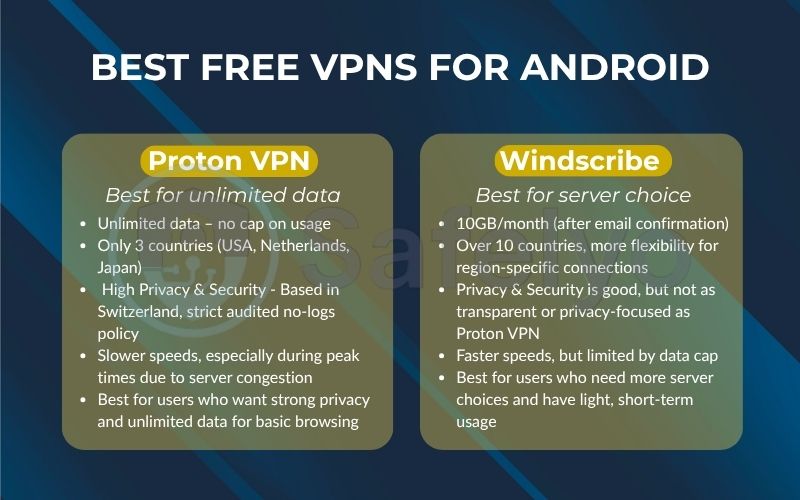
4.1. Proton VPN: Best for unlimited data
If there’s one standout in the free VPN world, it’s Proton VPN. Its commitment to privacy is backed by its Swiss jurisdiction and a strict, audited no-logs policy. But its killer feature for a free service is something no one else offers.
- What you get: You get truly unlimited data on their free plan. This is unheard of. I keep Proton’s free app on my phone as a reliable backup. If I’m ever in a pinch and just need basic security on a public network without worrying about hitting a data cap, it’s perfect.
- The catch: The trade-off is significant. You only get access to servers in 3 countries (USA, Netherlands, Japan), and the speeds are noticeably slower than their paid plans because the free servers are often congested. Think of it as a safe, but very crowded, single-lane highway. It’s not ideal for streaming or gaming, but it’s fantastic for secure browsing and checking emails.
>> Curious about their full privacy policy? Learn more about Proton VPN.
4.2. Windscribe: Best for server choice
Windscribe takes a different approach. It gives you more flexibility in terms of locations but puts a hard limit on your usage.
- What you get: Windscribe offers a generous 10GB data limit per month (if you confirm your email). The biggest advantage is that you get access to servers in over 10 countries, which is far more than Proton. This makes it a better choice if you need to connect to a specific region.
- The catch: That 10GB data limit can disappear quickly. It’s enough for a good amount of web browsing, checking social media, and maybe watching a few standard-definition videos. But if you’re a heavy user or try to stream HD movies, you’ll burn through it in no time. I think of it as a car with a small gas tank – it’s fast and gets you to more places, but you can’t go on a long road trip.
>> Want to see the full list of free server locations? Check out the free offering from Windscribe and sign up safely.
FREE ANDROID VPNS TO AVOID
Now for the most important part of this section. For every decent free option like Proton or Windscribe, there are a hundred dangerous ones. Based on my research and industry reports on privacy practices, you should avoid apps like Turbo VPN, Betternet, Hola VPN, and most other top-listed free VPNs on the Play Store.
Using one of these is like hiring a security guard who secretly copies your keys and sells them. They often have invasive logging policies, are filled with trackers, and bombard you with ads. In my professional opinion, using one of these services is often more dangerous than using no VPN at all. Stick to the two trusted providers above for light use, or better yet, invest a few dollars a month in a premium service for real security and peace of mind.
5. How to manually set up a VPN on Android
Did you know that your Android phone has a built-in VPN client? It’s true. You don’t always need a third-party app to create a VPN connection. This method is useful if you need to connect to a specific private network, like your company or university network, that doesn’t have its own app.
From my experience, while it’s a neat feature, it’s a bit like knowing how to change the oil in your car. It’s a useful skill, but most people prefer the convenience and added benefits of going to a professional. Here’s how you can do it yourself, followed by why you’ll probably still want a dedicated app from providers like NordVPN or ExpressVPN.
Step-by-step guide to manual configuration
Setting this up requires you to get the connection details from your VPN provider or network administrator first. Once you have that information (server address, VPN type, username, password), the process is straightforward.
- Open your phone’s Settings app.
- Tap on “Network & internet.” On some devices, this might be under “Connections.”
- Find and tap on “VPN.”
- Tap the plus sign (+) in the top-right corner to add a new VPN profile.
- Enter the VPN details provided to you. This includes:
- Name: Give the connection a name you’ll recognize (e.g., “Work VPN”).
- Type: Choose the VPN protocol (like IKEv2/IPSec). Your provider will tell you which one to use.
- Server address: The specific address of the VPN server.
- Username and Password: Your login credentials.
- Tap “Save.”
Now, you’ll see your new VPN profile in the list. Just tap on it and hit “Connect” to activate it.
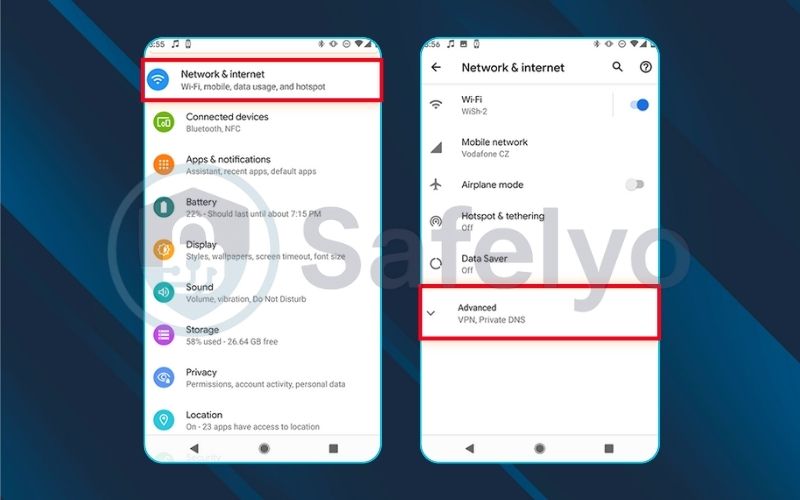
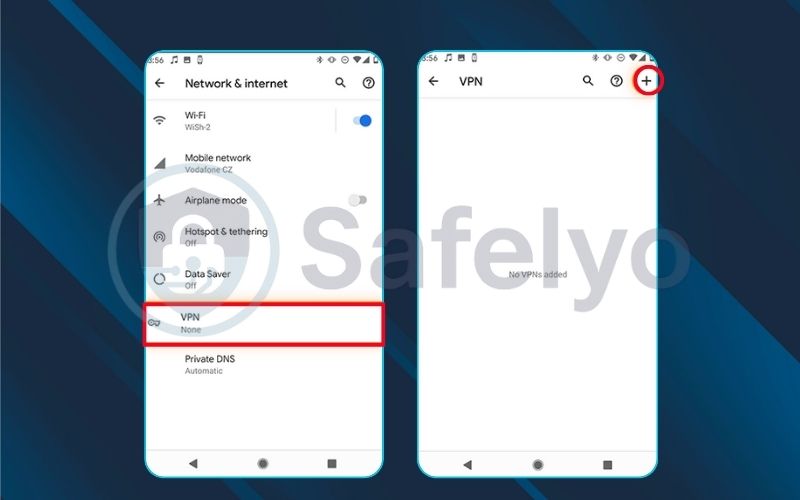
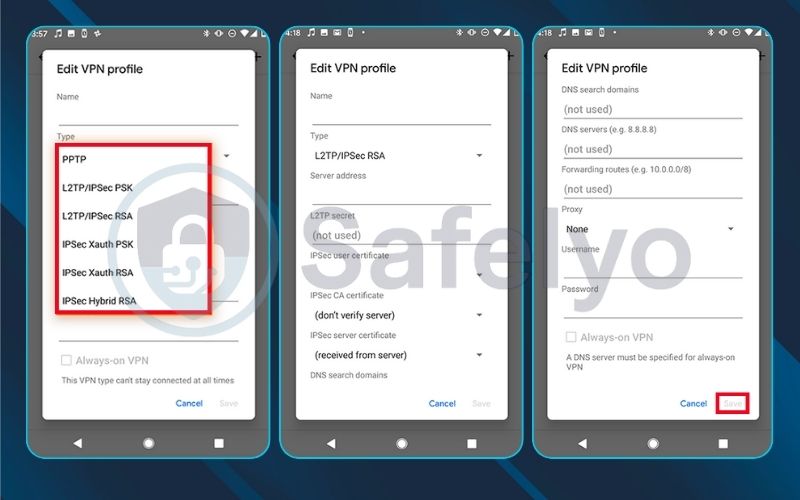
Why a dedicated app is almost always better
So, why don’t we all just do this? I’ve set up manual connections many times for testing, and the reasons to stick with a dedicated app are very clear:
- Lack of advanced features: The built-in Android client is bare-bones. It doesn’t include critical features like a kill switch or split tunneling. If your VPN connection drops, your phone will just revert to your regular, unprotected connection without any warning, which defeats a major purpose of using a VPN for security.
- Inconvenience: With a manual setup, you’re stuck with one server. If you want to switch from a server in New York to one in London, you have to create a whole new profile. With an app, I can switch between dozens of countries with a single tap.
- Simplicity and support: A good app just works. It handles all the complex configurations behind the scenes. And if something goes wrong, you have customer support to help you out. With a manual setup, you’re on your own.
In short, manual configuration is a great tool for specific corporate or technical uses, but for everyday privacy and security, a dedicated app from a top provider offers a far superior, safer, and more user-friendly experience.
6. FAQ about the best VPN for Android
I get asked a lot of questions about using VPNs on Android, and many of them pop up time and time again. Here are the clear, straightforward answers to some of the most common queries I encounter.
What is the best VPN for Android?
Based on our extensive testing of app features, performance, and security, NordVPN stands out as the best overall VPN app for Android. However, ExpressVPN is a fantastic choice for simplicity, and Surfshark offers the best value for your money.
Does Android have a built-in VPN?
Yes, Android has a built-in VPN client that supports protocols like IKEv2. However, it requires manual configuration and lacks critical features like a kill switch or split tunneling that dedicated VPN apps from our list provide for much better security and convenience.
Is it safe to download a VPN APK file?
It can be very risky. I strongly advise against it unless you are downloading the APK file directly from the official website of a trusted VPN provider. Downloading from third-party sites can expose you to malware or modified apps that are designed to steal your data. The safest method is always to use the Google Play Store.
What is split tunneling on Android, and why is it useful?
Split tunneling is a feature that lets you choose which apps use the VPN and which ones use your regular internet. For example, you can route your mobile banking app through the VPN for maximum security while letting your food delivery app use your real location to work correctly. It gives you the perfect balance of security and convenience.
What’s the difference between Android’s built-in kill switch and an app’s kill switch?
Android has a system-level kill switch (‘Block connections without VPN’) that you can enable in the settings. It’s very reliable but blocks all internet traffic if the VPN drops. Many top VPN apps like NordVPN offer their own integrated kill switch, which provides more flexibility, especially when used with split tunneling. For maximum security, I often recommend using both.
7. Conclusion
Protecting your Android phone with a VPN is no longer an option – it’s an essential step in safeguarding your digital life. But as we’ve seen, choosing the right app from a sea of confusing options is a real challenge. A truly best VPN for Android must deliver a perfect balance of robust security, an intuitive app experience, and performance that doesn’t slow you down or kill your battery.
To help you make the best choice, here are the key takeaways from our testing:
- Performance Matters Most: The best VPNs have a minimal impact on your speed and battery life. Our tests show top providers only use 2-3% more battery than not using a VPN at all.
- App Experience is Key: Look for apps with one-tap connections, useful features like split tunneling, and a clean interface.
- “Free” is Rarely Free: Be extremely cautious with free VPNs. Stick to reputable providers like Proton VPN or Windscribe for light use, and avoid others that may sell your data.
- You Can’t Go Wrong with the Top 3: For most users, NordVPN (best overall), ExpressVPN (easiest to use), or Surfshark (best value) will be a perfect fit.
Your Android phone is your lifeline. Don’t leave it exposed. By choosing a top-rated service from this list of Safelyo, you can secure your digital life in minutes. Explore our other guides in the Best VPN category to become an expert on online privacy and take full control of your security today.


